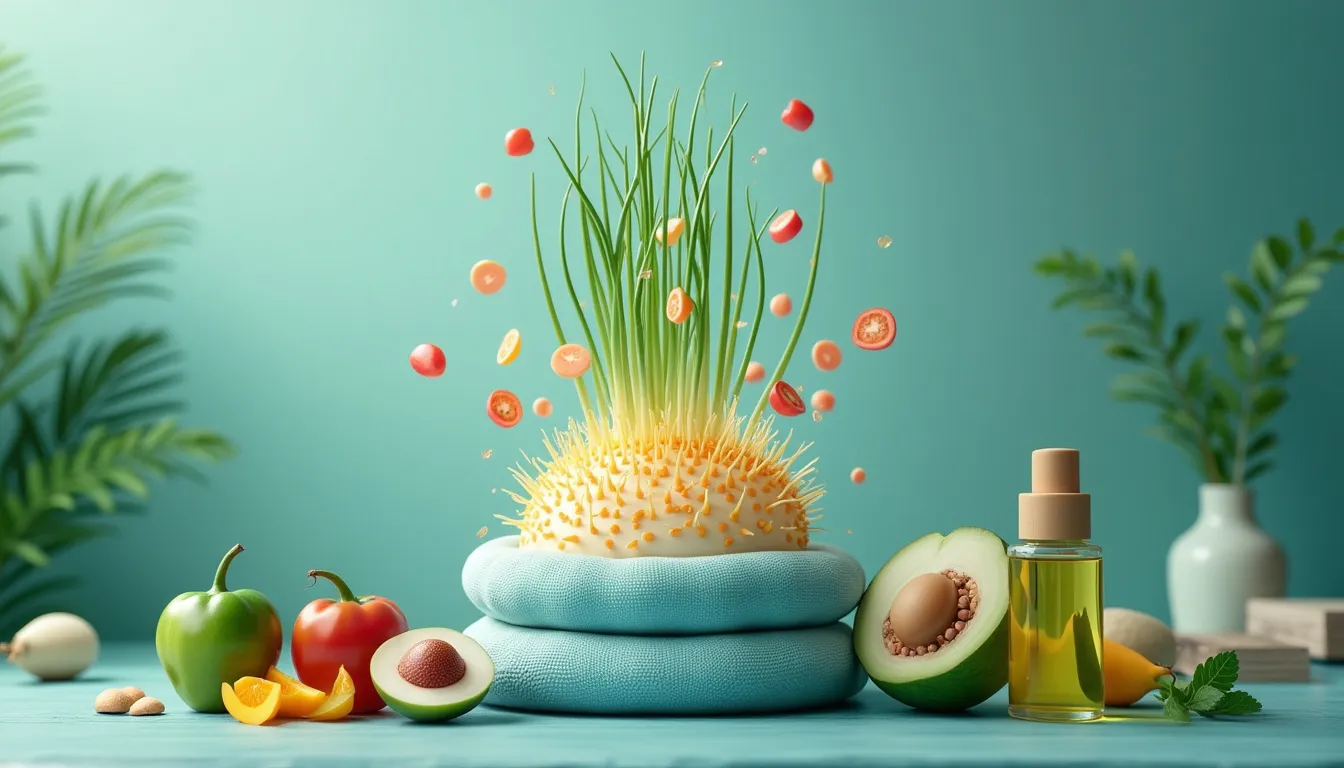Are you tired of dealing with an itchy, flaky scalp or thinning hair? The secret to luscious locks might be hiding right under your hair – it’s all about scalp health! Often overlooked, your scalp plays a crucial role in the overall health and appearance of your hair. Just like the soil nurtures a plant, a healthy scalp provides the perfect foundation for strong, vibrant hair growth. But what exactly is scalp health, and why is it so important? In this comprehensive guide, we’ll dive deep into the world of scalp care, exploring common issues and their root causes. More importantly, we’ll reveal five essential tips that will revolutionize your hair care routine and put you on the path to optimal scalp health. Whether you’re battling dandruff, excessive oiliness, or simply want to maintain a healthy head of hair, these expert-backed strategies will help you achieve the scalp – and hair – of your dreams. So, sit back, relax, and get ready to unlock the secrets to a healthier scalp and more beautiful hair!
1. Understanding Scalp Health
When it comes to maintaining luscious locks, we often focus on the visible part of our hair, forgetting about the foundation it all grows from – our scalp. Understanding scalp health is crucial for anyone looking to improve their overall hair wellness and prevent common hair problems. Let’s dive into the world of scalp health and discover why it’s so important for your crowning glory.
1.1. Definition of Scalp Health
Scalp health refers to the overall condition of the skin on your head where hair grows. A healthy scalp is characterized by:
- Balanced oil production
- Absence of irritation or inflammation
- Proper hydration
- Normal skin cell turnover
- A balanced microbiome
When your scalp is in good condition, it provides an optimal environment for hair growth, resulting in stronger, healthier hair. Think of your scalp as the soil in a garden – if the soil is rich and well-maintained, the plants (or in this case, your hair) will thrive.
1.2. Importance of Scalp Health for Overall Hair Wellness
The state of your scalp directly impacts the health and appearance of your hair. Here’s why maintaining optimal scalp health is crucial:
- Promotes Hair Growth: A healthy scalp ensures that hair follicles receive proper nutrition and oxygen, promoting robust hair growth.
- Prevents Hair Loss: Many hair loss issues stem from scalp problems. By keeping your scalp healthy, you can reduce the risk of hair thinning and shedding.
- Improves Hair Texture: A well-nourished scalp leads to stronger, shinier, and more manageable hair.
- Reduces Dandruff: Proper scalp care helps prevent the build-up of dead skin cells, reducing dandruff and flaking.
- Enhances Product Effectiveness: A clean, healthy scalp allows hair care products to penetrate more effectively, maximizing their benefits.
By prioritizing scalp health, you’re not just addressing surface-level concerns but investing in the long-term vitality of your hair. It’s like giving your hair a solid foundation to grow and flourish.
1.3. Common Scalp Issues and Their Causes
Understanding common scalp issues is the first step in maintaining optimal scalp health. Let’s explore some of the most frequent problems and their root causes:
Dandruff
Characterized by white, flaky skin on the scalp, dandruff is one of the most common scalp issues. Contrary to popular belief, it’s not always caused by dry skin. The main culprits include:
- Overgrowth of a yeast-like fungus called Malassezia
- Increased oil production
- Sensitivity to hair care products
- Infrequent shampooing
Seborrheic Dermatitis
A more severe form of dandruff, seborrheic dermatitis causes red, scaly patches on the scalp. It can be triggered by:
- Stress
- Hormonal changes
- Certain medical conditions
- Cold, dry weather
Dry Scalp
A dry scalp can lead to itching, flaking, and even hair breakage. Common causes include:
- Harsh shampoos that strip natural oils
- Cold weather or low humidity
- Dehydration
- Nutritional deficiencies
Oily Scalp
An excessively oily scalp can make hair appear greasy and limp. It’s often caused by:
- Overactive sebaceous glands
- Hormonal imbalances
- Stress
- Overwashing (which can stimulate more oil production)
Scalp Psoriasis
This autoimmune condition causes thick, silvery scales on the scalp. While the exact cause is unknown, triggers can include:
- Stress
- Skin injuries
- Certain medications
- Infections
By recognizing these common scalp issues and their causes, you can take proactive steps to maintain optimal scalp health. Remember, a healthy scalp is the secret to beautiful, vibrant hair.
If you’re struggling with persistent scalp issues or hair loss, it’s worth exploring comprehensive solutions. One program that has been gaining attention for its holistic approach to hair health is HairFortin. This innovative program addresses various aspects of scalp and hair care, potentially offering a path to healthier, fuller hair.
Understanding scalp health is just the first step in your journey to fabulous hair. By recognizing the importance of a healthy scalp and identifying common issues, you’re well on your way to achieving the luscious locks you’ve always dreamed of. Stay tuned as we delve deeper into essential tips for maintaining optimal scalp health in the next sections.

Essential Tips for Maintaining Optimal Scalp Health
When it comes to maintaining a healthy head of hair, we often focus on the strands themselves, forgetting about the foundation from which they grow. However, optimal scalp health is crucial for vibrant, strong hair. Let’s dive into five essential tips that will help you achieve and maintain a healthy scalp, promoting better hair growth and overall hair wellness.
1. Regular Cleansing and Exfoliation
Just like the skin on your face, your scalp needs regular cleansing to remove dirt, excess oil, and product buildup. However, it’s important to strike a balance – over-washing can strip your scalp of its natural oils, while under-washing can lead to buildup and potential scalp issues.
Here are some key points to remember:
- Wash your hair 2-3 times a week, or as needed based on your hair type and lifestyle
- Use lukewarm water, as hot water can dry out your scalp
- Choose a gentle, sulfate-free shampoo that’s suitable for your hair type
- Massage the shampoo into your scalp using your fingertips, not your nails
Exfoliation is another crucial step in maintaining scalp health. It helps remove dead skin cells and unclog hair follicles, promoting better hair growth. You can use a scalp scrub once a week or a soft-bristled brush to gently exfoliate your scalp before washing.
2. Proper Nutrition and Hydration
What you put into your body reflects on your scalp and hair health. A balanced diet rich in vitamins, minerals, and proteins is essential for maintaining a healthy scalp. Some key nutrients for scalp health include:
- Vitamin A: Helps in sebum production, keeping your scalp moisturized
- B-vitamins: Promote cell growth and reduce inflammation
- Vitamin C: Aids in collagen production and protects against free radicals
- Vitamin E: Improves blood circulation in the scalp
- Zinc: Helps in tissue growth and repair
- Omega-3 fatty acids: Reduce inflammation and promote hair growth
Staying hydrated is equally important. Drinking plenty of water helps flush out toxins from your body and keeps your scalp hydrated from within. Aim for at least 8 glasses of water a day.
3. Scalp Massages and Stimulation
Regular scalp massages can work wonders for your scalp health. They improve blood circulation, which in turn promotes hair growth and helps distribute natural oils evenly across your scalp. Here’s how you can incorporate scalp massages into your routine:
- Use your fingertips to gently massage your scalp in circular motions
- Spend about 5-10 minutes on this activity
- You can do this while applying oil, during shampooing, or anytime your scalp feels tense
- Consider using a scalp massager tool for added benefits
Additionally, brushing your hair regularly (but gently) can help stimulate your scalp and distribute oils from root to tip. Use a brush with natural bristles for best results.
4. Protection from Environmental Factors
Your scalp is constantly exposed to various environmental factors that can affect its health. Here are some ways to protect your scalp:
- Use a hat or scarf when out in the sun to prevent UV damage
- Apply a leave-in conditioner with UV protection if you’re spending a lot of time outdoors
- In cold weather, keep your head covered to prevent dryness
- Use a humidifier in dry environments to add moisture to the air
- Rinse your hair after swimming in chlorinated or salt water
Remember, pollution can also affect your scalp health. Consider using anti-pollution hair care products if you live in a highly polluted area.
5. Stress Management and Lifestyle Adjustments
Stress can have a significant impact on your scalp health, potentially leading to issues like dandruff, hair loss, and even scalp inflammation. Managing stress is crucial for maintaining a healthy scalp. Here are some strategies:
- Practice relaxation techniques like meditation or deep breathing exercises
- Engage in regular physical activity
- Ensure you’re getting enough sleep (7-9 hours for most adults)
- Consider stress-reducing activities like yoga or tai chi
Other lifestyle factors can also affect your scalp health. Smoking, for instance, can restrict blood flow to your scalp, affecting hair growth. Excessive alcohol consumption can lead to dehydration, impacting your scalp’s moisture balance. Making conscious lifestyle choices can significantly improve your scalp health.
Maintaining optimal scalp health is an ongoing process that requires consistent care and attention. By incorporating these tips into your daily routine, you’ll be well on your way to a healthier scalp and, consequently, healthier hair. Remember, everyone’s scalp is different, so it might take some time to find the perfect routine for you. Be patient, stay consistent, and your scalp will thank you!
If you’re struggling with persistent scalp issues despite following these tips, it might be time to consider a targeted solution. HairFortin is a program designed to address various hair and scalp concerns, potentially offering the boost your scalp needs for optimal health.
In conclusion, maintaining optimal scalp health is a crucial aspect of overall hair wellness that often goes overlooked. By implementing these five essential tips – regular cleansing and exfoliation, proper nutrition and hydration, scalp massages and stimulation, protection from environmental factors, and stress management – you can significantly improve the health of your scalp and, consequently, the quality of your hair.
Remember that a healthy scalp is the foundation for healthy hair growth. Just as we care for the skin on our face and body, we must extend that same level of attention to our scalp. By incorporating these practices into your daily routine, you can address common scalp issues, prevent future problems, and create an environment that promotes strong, vibrant hair growth.
It’s important to note that everyone’s scalp is unique, and what works for one person may not work for another. Be patient and consistent with your scalp care routine, and don’t hesitate to consult a dermatologist or trichologist if you experience persistent scalp issues.
Ultimately, investing time and effort in maintaining scalp health is an investment in your overall appearance and well-being. A healthy scalp not only contributes to better hair quality but can also boost your confidence and self-esteem. So, start prioritizing your scalp health today, and enjoy the benefits of a healthier, happier head of hair tomorrow.
